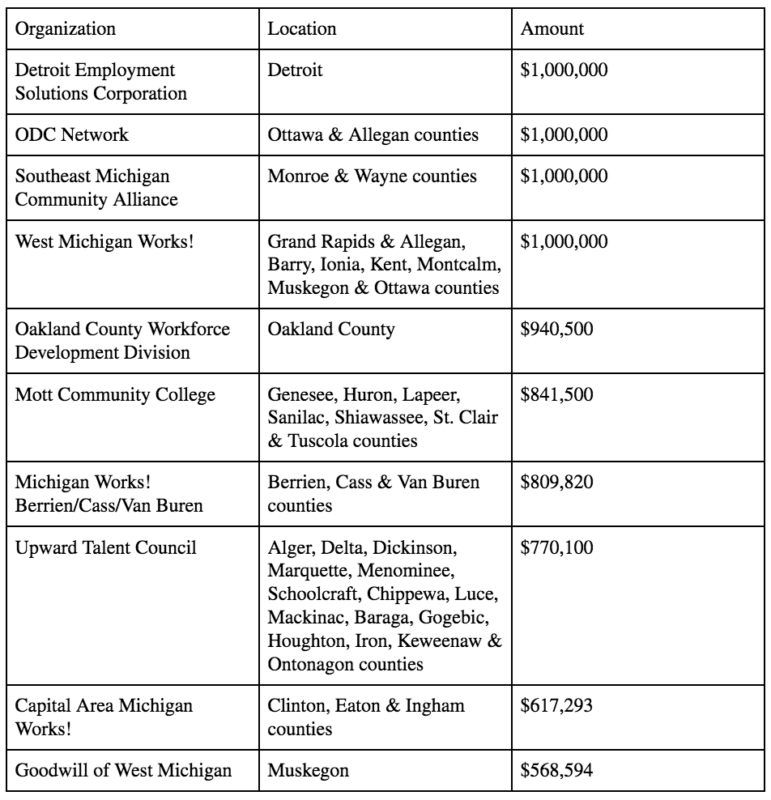
By THEO SCHEER
Capital News Service
LANSING — Many Michigan residents want to work but may struggle with money for clothes or transportation to a job. Recent state grants seek to remove those barriers.
Berniz Terpstra, the vice president of housing and family services for ICCF Community Homes, recently worked with a Grand Rapids man who had lost his driver’s license nearly a decade ago.
The individual couldn’t easily get to the Secretary of State’s office to retake the test, and finding a job he could travel to daily seemed out of the question.
But with the help of ICCF, a Grand Rapids-based nonprofit that helps Kent County residents secure employment and housing, “he got his license and is looking into a car,” Terpstra said, a huge step towards employment.
ICCF serves over a thousand people a year. With a $360,000 grant it recently received from the Department of Labor and Economic Opportunity, the agency is now able to expand its services and offer more money for individuals to use for work clothes and transportation costs.
“We’re able to go that extra mile for them,” Terpstra said.
Labor and Economic Opportunity awarded $14.4 million to local nonprofits last month.
The grants were distributed among 27 organizations that serve low-income residents with difficulties getting or maintaining jobs, including programs that serve Marquette, Hillsdale, Montcalm, Alpena, Iron, Monroe, Cheboygan, Chippewa and Wayne counties, among others.
“In Michigan, our labor force participation has traditionally lagged the national average,” said Labor and Economic Growth Director Susan Corbin. “But we’ve made some great strides during this governor’s administration in terms of closing that labor force participation rate.”
Many recipients are already planning what they’ll do with the extra cash.
A grant of $422,493 went to 70×7 Life Recovery, a Christian organization that supports those getting out of prison or jail. It serves Kent and Ottawa counties with locations in Grand Rapids and Holland.
Cheryl Wyman, the executive assistant for 70×7’s Grand Rapids branch, said that people who have been recently released from incarceration often don’t have access to transportation and new clothes, making it harder to get and retain a job. The grant will help the organization provide more resources to combat those barriers.
“We’ll be able to purchase more bus passes,” Wyman said. “We’ll be able to buy more gas cards for people with vehicles.”
The organization also helps with food access and sometimes assists in paying rent.
Corbin says its grant is part of a state-wide effort to support formerly incarcerated people’s success in the workforce, from “vocational villages” in prisons that teach skilled trades, to the recent Clean Slate law, which allows for some misdemeanors and felonies to be expunged or removed, from criminal records.
“Especially during this very, very tight labor market, employers should be looking more and more at justice-involved individuals,” Corbin said.
Chuck Warpehoski, the director of the Michigan Collaborative to End Mass Incarceration, said the grant and other initiatives are a good step, but “just a shadow of what is needed.”
“We hear from men and women who have come home from prison, and what they say is the (reentry programs) should have been starting from day one, not when they’re getting close to their out-date,” Warpehoski said.
“The job skills, the life skills programming that is available, the little bit that’s there – they wanted it from the beginning so they’re able to begin their reentry from the time they begin in prison,” he said.
Samantha Jones, the executive director of PartnerShift Network, said the $247,500 awarded to her nonprofit organization will expand its services from Saginaw to other communities in the region, like Midland and Isabella counties.
PartnerShift teaches community members financial literacy through one-on-one relationships with coaches. It also offers direct financial assistance.
“It’s hard enough to survive when you continually have these expenses and challenges dropped on you,” Jones said. “Through budgeting and financial literacy – and bind that with compassion – that is where we find success.”